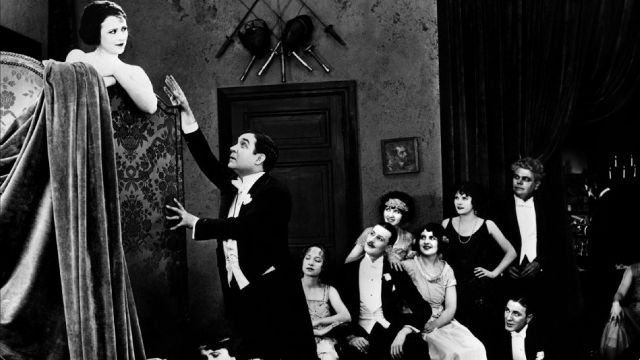A Woman of Paris (1923) 

Director: Charles Chaplin
Cast: Edna Purviance, Clarence Geldart, Carl Miller
Synopsis: A kept woman runs into her one-time fiancé and finds herself torn between love and comfort.
It seems that even as far back as 1923, screen comedians harboured a desire to explore more serious material, and as the world’s greatest comedian, Charles Chaplin was in a strong position to get his way. Apparently, his prime objective in writing and directing A Woman of Paris was to develop the career of his frequent co-star (and sometime lover) Edna Purviance separate from himself. However, the movie was a box office and critical failure, and although it boosted the career of Adolphe Menjou, it did little for Purviance’s. She followed this with Josef von Sternberg’s A Woman of the Sea, which was never released and was allegedly destroyed by Chaplin (who produced) in 1933 for tax purposes. Her career then fizzled out with the little-seen French movie Education of a Prince in 1927.
The story opens with two young lovers, Marie St. Clair (Purviance) and Jean Millet (Carl Miller) meeting clandestinely one night to discuss their planned elopement to Paris the following night. However, Marie’s disapproving father (Clarence Geldert) gets wind of the fact that Marie has sneaked out through the window of her locked bedroom and bars her from the house, pretty much telling Jean that he washes his hands of her and she’s now all his. Jean takes her back to his parent’s house, where her welcome is no less frosty, and Jean’s father (Charles French) tells Jean to get her out of his house. Quite why each of their parents are so disapproving is never explained, but the youngsters’ determination to be together cuts no ice with them.
With nowhere to sleep, Jean and Marie bring forward their planned elopement and Jean drops Marie off at the train station before returning home to get his gear. But while he’s back home his father suffers a fatal heart attack, and when Marie phones to see where he is, Jean says he can’t go with her. Now, if he’d said ‘I can’t go with you because my Dad’s just dropped down dead,’ I can’t help thinking she wouldn’t have just hung up and climbed on the first train to Paris. But because he doesn’t, that’s exactly what she does.
Fast forward a year, and Marie’s a completely changed character, living in an apartment paid for by the wealthy playboy Pierre Revel (Adolphe Menjou). Thanks to Pierre’s money, Marie lives a pampered lifestyle in return for which all she has to do is accompany him to Paris’s swankiest restaurants and wildest parties, and convince as a willing playmate in the boudoir. But, of course, this lifestyle doesn’t really fulfil Marie, although she doesn’t truly realise this until she unexpectedly runs into Jean, who’s now living in a tiny apartment in Paris with his mother as he attempts to eke out a living as an artist. It’s clear from the off that the spark between them is still there, and when Marie learns the reason why Jean failed to accompany her to Paris she is suddenly certain that she made the wrong decision, and that Jean is the man she wants to be with, even though he hasn’t got a pot to… paint. However, Jean’s mum remains dead set against the two of them getting back together — especially as she believes it was the stress of Jean leaving home with her that caused her husband’s heart attack.
There’s something subversive about A Woman of Paris – for the era in which it was made, at least. Chaplin’s lead characters aren’t cast from conventional moulds in that, unlike most screen heroes and heroines of the 1920s, they’re not perfect people faced with difficult situations. Marie and Jean are both flawed characters; Jean is weak (and shouts at his mum – something which must have outraged the likes of D W Griffith, for whom ‘mother’ was the symbol of virtuous goodness, unwaveringly treated like precious fine china by her offspring), while Marie is prepared to set aside any aspirations she has for the sake of a comfortable life as Revel’s mistress. Revel, meanwhile, who is arguably the moral villain of the piece, is an amiable, easy-going chap who is entirely likeable – if perhaps a little roguish – and completely upfront about his amoral lifestyle. And the plot resolves itself unlike any other film of its era or – or of probably the next fifty years. So perhaps it’s no wonder A Woman of Paris suffered so badly at the hands of the critics.
Today, we can appreciate the many qualities of A Woman of Paris, and while it perhaps doesn’t qualify as a classic, it’s still a remarkably assured and sophisticated piece of work, especially given that it was made in 1923, just a few years after the language of film had reached its full form. Chaplin displays a firm grasp of his craft — something which might seem obvious given the number of years he’d already been working in cinema, but which is a massive achievement considering he was working outside of his established genre. The story might be slight, but the depth of characterisation is rich, particular in the case of Purviance’s heroine. A Woman of Paris is required viewing for anyone with an interest in the history and development of cinema.
(Reviewed 27th November 2013)
httpv://www.youtube.com/watch?v=ls92eTNYDGY
